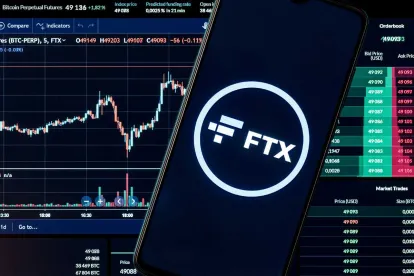The recent implosion of crypto firm FTX and its affiliates provides a case study for potential crypto exposure under traditional insurance policies. The FTX debacle is described herein is an introduction to a series of four articles on the potential liability exposure and coverage: Silent Crypto for D&O and Corporate Liability Insurance (Part I), Silent Crypto Exposure for Accountants (Part II), Silent Crypto Exposure for Lawyers (Part III), and Crime and Custody Coverage for Crypto Assets (Part IV).
The family of FTX entities (collectively, FTX) was run by Sam Bankman-Fried (SBF), an American entrepreneur, investor and former billionaire, and operated in the Bahamas and the United States in Miami, Florida. FTX began in 2019 as an exchange for trading and lending crypto and digital assets. In addition, FTX operated a mobile application offering investment services for retail and professional firms to trade cryptocurrencies. The apparent success of the FTX exchange was based on its significant daily trading volume estimated at $15 billion or 10 percent of the global volume for crypto trading.
To generate continued growth, buzz and excitement from everyday retail investors who were often new to the world of cryptocurrencies, FTX obtained paid celebrity endorsements that included some of the biggest names in sports and Hollywood, including many NFL and NBA superstars, to serve as FTX brand ambassadors. According to a recent lawsuit, none of these celebrities disclosed the amount of compensation they received for hyping FTX, and none of them did any due diligence on FTX’s business and trading activities.
The Alleged Investment Fraud Scheme
FTX allegedly rode the celebrity wave and popular hype to entice unsophisticated investors to invest in yield-bearing cryptocurrency accounts (YBAs). In essence, investors could deposit their digital assets in an account and lend these assets in exchange for an interest payment. While this may sound similar to a bank savings or checking account, there are some key differences. Although YBAs may offer to pay exceedingly high yields as compared with bank deposits, YBAs are not insured by the Federal Deposit Insurance Corporation (FDIC). Furthermore, FTX and many other crypto firms and exchanges are not regulated. Therefore, if a borrower cannot repay investors, they typically have very limited recourse.
FTX Bankruptcy
FTX’s 2022 bankruptcy filing was reportedly precipitated by the firm’s undisclosed lending activities to its sister company, Alameda Research (Alameda). According to news reports, FTX loaned investor assets to enable Alameda to make extremely risky trading bets. As alleged in the complaint, SBF secretly transferred $4 billion in customer funds from FTX to Alameda after the latter was hit with a series of losses. In addition, FTX allegedly loaned more than $8 billion in customer funds to Alameda in total, with more than $10 billion in loans outstanding. Much of Alameda’s balance sheet was a token issued by FTX known as “FTT,” which was acquired by FTX investors for investment and trading purposes.
When other large crypto exchanges began to question FTX’s stability and liquidated their FTT holdings, this effectively created a run on the exchange while customers raced to withdraw assets totaling billions of dollars in just a few days. This led to the collapse of the price of FTT and the ultimate demise of FTX, which filed for Chapter 11 bankruptcy protection in Delaware bankruptcy court on November 11, 2022. Incredulously, the day before FTX’s bankruptcy filing, SBF attempted to reassure investors by posting on social media that, “This was about FTX International. FTX U.S., the U.S.-based exchanged that accepts American, was not financially impacted by this ****show. It’s 100% liquid.”
In a declaration filed by FTX’s new post-bankruptcy CEO, John J. Ray III, on November 17, 2022, he observed:
[N]ever in my career have I seen such a complete failure of corporate controls and such a complete absence of trustworthy financial information as occurred here. From compromised systems integrity … to the concentration of control in the hands of a very small group of inexperienced, unsophisticated and potentially compromised individuals, this situation is unprecedented.1
This is significant criticism coming from the same individual who served as the Chief Restructuring Officer in the now infamous collapse of Enron.
FTX Class Action Lawsuit
Just days after filing for bankruptcy, the FTX crypto-saga continued as the company’s former CEO, SBF, and nearly a dozen celebrity sponsors of the now defunct crypto trading exchange were named as defendants in a nationwide class action filed on November 15, 2022, in Florida federal court for violations of Florida securities laws and consumer protection laws.[ii] The lawsuit was brought on behalf of a nationwide class of investors who purchased YBAs from FTX. The irony is that FTX and other crypto firms have attempted to evade U.S. securities laws and regulatory oversight by registering their businesses offshore. Given the unprecedented magnitude of FTX’s implosion with tens of billions of dollars in investor losses, state and federal regulators are likely to join the prosecution party.
The crux of the complaint is that defendants deceived investors into purchasing FTX YBAs, which are purportedly “securities” as defined by securities laws and the so-called Howey test set forth by the U.S. Supreme Court in SEC v. W.J. Howey Co., 328 U.S. 293 (1946) – decided long before the advent of cryptocurrencies and digital assets. Under this test, an investment contract is a security when it meets the following criteria: (1) the purchaser makes an investment of money or exchanges another item of value (2) in a common enterprise (3) with the reasonable expectation of profits to be derived from the efforts of others.
Plaintiffs also rely heavily on a declaration filed on October 14, 2022, by Joseph Rotunda, the Director of Enforcement of the Texas State Securities Board, in connection with the collapse of yet another unrelated cryptocurrency exchange. According to the Rotunda Declaration, FTX may have been engaged in the unregistered sale of securities in the form of YBAs in addition to duping investors:
Based on … an ongoing investigation by the Enforcement Division of the Texas State Securities Board, the [FTX] yield program appears to be an investment contract … and, as such, appears to be regulated as a security in Texas as provided by … the Texas Securities Act. … FTX … [has] not been registered to offer or sell securities in Texas. FTX … may therefore be violating … the Texas Securities Act.
Finally, FTX … may not be fully disclosing all known material facts to clients prior to opening [YBA] accounts and earning yield, thereby possibly engaging in fraud by making offers containing statements that are materially misleading or otherwise likely to deceive the public.
The complaint asserts claims against FTX and the other defendants for:
-
Violation of the Florida Securities and Investor Protection Act in connection with the sale of YBAs, which constitute unregistered securities
-
Violation of the Florida Deceptive and Unfair Trade Practices Act by deceiving individuals to invest in FTX’s purported Ponzi scheme
-
Civil conspiracy
-
Declaratory relief, including an order declaring that the YBAs were securities to be registered with the U.S. Securities and Exchange Commission (SEC) and state regulatory authorities.
FOOTNOTES
1 Declaration of John J. Ray III filed on November 17, 2022 in In re FTX Trading Ltd., et al., Case No. 22-11068 in the U.S. Bankruptcy Court for the District of Delaware.
2 Edwin Garrison v. Sam Bankman-Fried, et al., Case No. 1:22-cv-23753 in the U.S. District Court for the Southern District of Florida, Miami Division.



 />i
/>i
